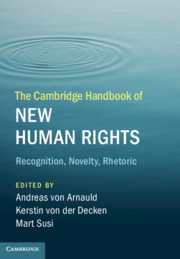Book contents
- The Cambridge Handbook of New Human Rights
- The Cambridge Handbook of New Human Rights
- Copyright page
- Contents
- Figures
- Contributors
- Acknowledgements
- Introduction
- Part I Cross-Cutting Observations
- Part II Public Good Rights
- The Right to Water
- Rights to Housing and to Land
- The Right to Health
- 8 The Right to Health under the ICESCR
- 9 Strong New Branches to the Trunk
- The Right to a Clean Environment and Rights of the Environment
- Part III Status Rights
- Part IV New Technology Rights
- Part V Autonomy and Integrity Rights
- Part VI Governance Rights
- Index
8 - The Right to Health under the ICESCR
Existing Scope, New Challenges and How to Deal with It
from The Right to Health
Published online by Cambridge University Press: 04 January 2020
- The Cambridge Handbook of New Human Rights
- The Cambridge Handbook of New Human Rights
- Copyright page
- Contents
- Figures
- Contributors
- Acknowledgements
- Introduction
- Part I Cross-Cutting Observations
- Part II Public Good Rights
- The Right to Water
- Rights to Housing and to Land
- The Right to Health
- 8 The Right to Health under the ICESCR
- 9 Strong New Branches to the Trunk
- The Right to a Clean Environment and Rights of the Environment
- Part III Status Rights
- Part IV New Technology Rights
- Part V Autonomy and Integrity Rights
- Part VI Governance Rights
- Index
Summary
The International Covenant on Economic, Social and Cultural Rights (ICESCR) is phrased in very vague and general, sometimes almost obscure language, and lends itself to many different interpretations. However, the Committee on Economic, Social and Cultural Rights (CESCR), established by the Economic and Social Council (ECOSOC) to monitor state party reports on economic, social and cultural rights (esc rights), has seen as one of its main monitoring functions to interpret the ICESCR provisions. It sees the Covenant as a comprehensive tool, covering both legal and policy issues under the umbrella of the law, and hands down suggestions and recommendations in the so-called ‘concluding observations’ on state party reports, clarifying the precise meaning of Covenant provisions in concrete situations. From time to time, when sufficient ‘committee practice’ has evolved, the CESCR will also formulate General Comments (GCs) that seek to clarify the meaning and content of the specific esc right under review. The mandate to issue GCs was given by ECOSOC in 1987, similar to other human rights treaty bodies. By 2018 nearly all substantive Covenant provisions had been assessed by the Committee. The findings have been included in Revised Guidelines for reporting on the esc rights situation in member states, to facilitate their reporting and to ensure that the standards of analysis follow the same pattern for each country.
- Type
- Chapter
- Information
- The Cambridge Handbook of New Human RightsRecognition, Novelty, Rhetoric, pp. 107 - 123Publisher: Cambridge University PressPrint publication year: 2020
- 2
- Cited by

